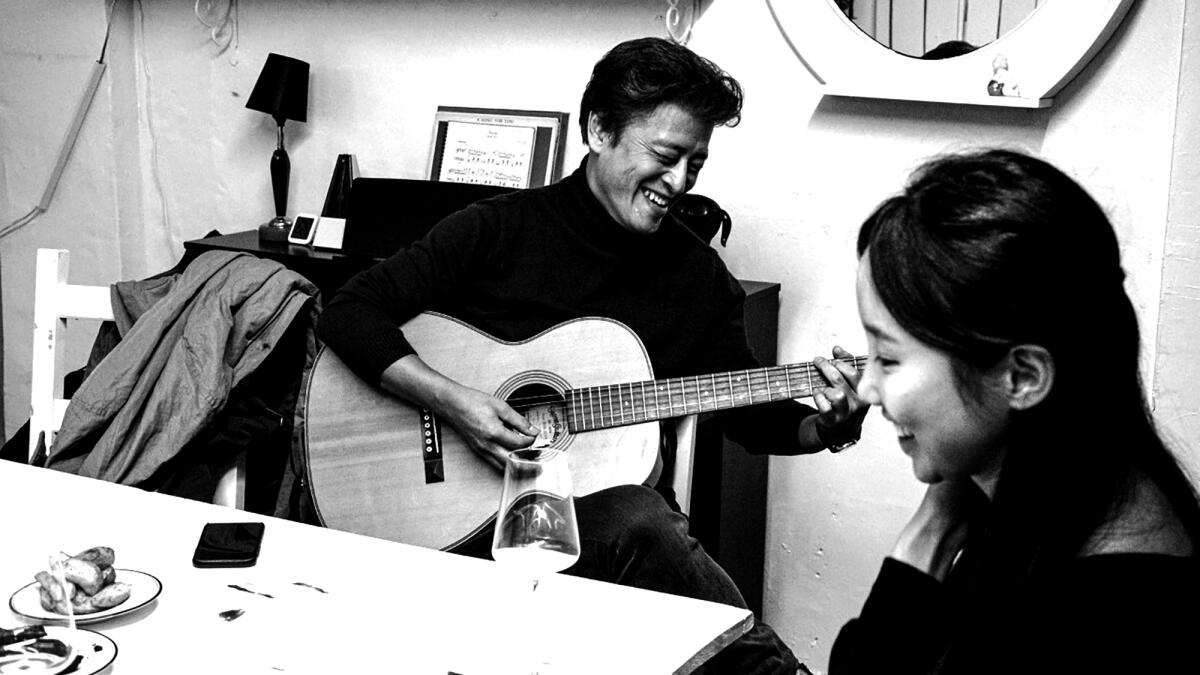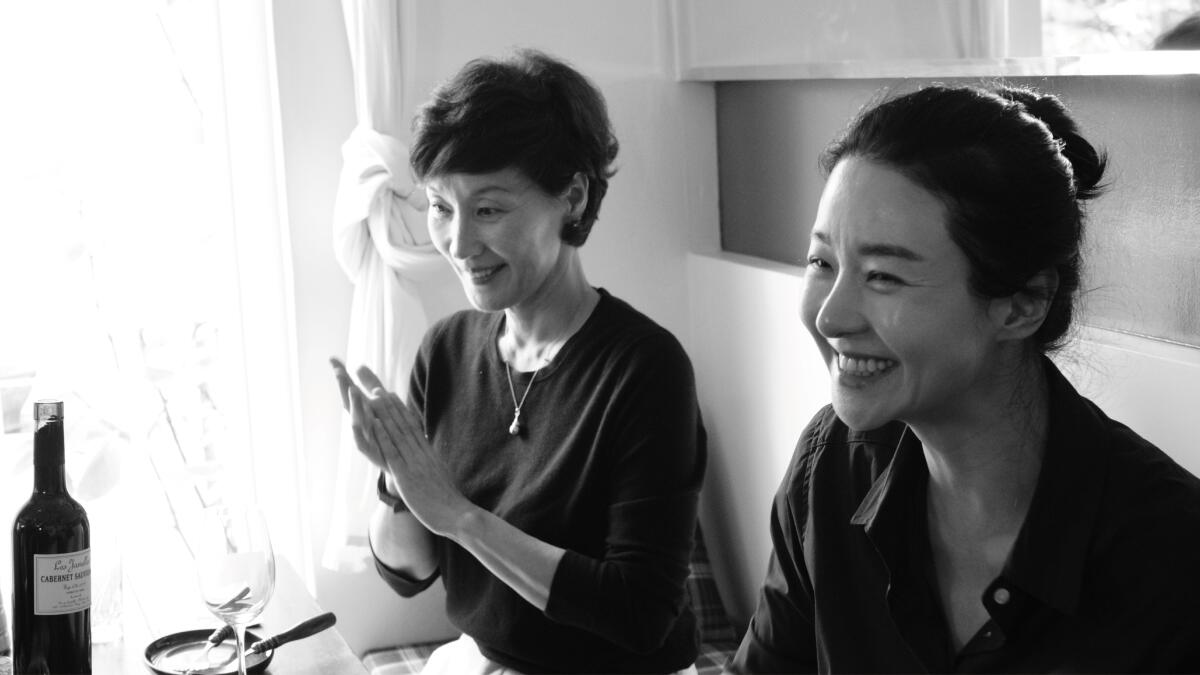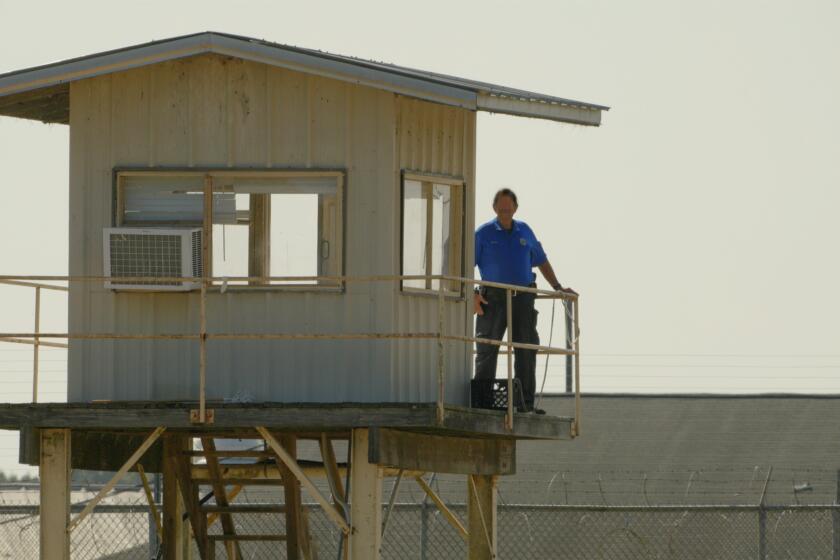Review: Hong Sang-soo has made a lot of terrific movies. ‘Walk Up’ is among his best

- Share via
In the simplest and most startling scene in “Walk Up,” a witty, ingenious and deeply moving tour de force from South Korean writer-director Hong Sang-soo, a middle-age filmmaker named Byung-soo (Kwon Hae-hyo) settles down for a midday nap. It’s the only moment in the movie when he’s completely alone, although even as he savors his solitude, clinging to a pillow as if it were his dearest friend, snatches of conversation — between himself and his girlfriend, Sun-hee (Song Sun-mi) — can’t help but play out in his head. They talk about her recent reunion with an old friend, as well as their plans to move to beautiful Jeju Island in a few years’ time. Is Byung-soo imagining this dialogue, or is it being beamed in from the future? And why, despite his and Sun-hee’s ardent expressions of love for each other, does it feel like the beginning of the end?
The fleeting nature of relationships and the slippery parameters of (fictional) reality are hardly new thematic concerns for Hong, as his many admirers will know. But while some familiarity with his enormous, ever-expanding body of work certainly enriches the experience (this is his 28th feature in 26 years), I suspect that “Walk Up” might play especially well to the uninitiated.
The movie, exquisitely shot in black-and-white and unspooling in Hong’s preferred serio-comic idiom of long, boozy meals and funny-sad chatter, is a triptych of tales set in a three-floor walk-up (“three stories” pun hopefully very much intended). If that sounds dull or confusing, it isn’t: “Walk Up” flows as absorbingly as a dream and is no less pleasurable to puzzle over afterward.
But whose dream is it? That image of Byung-soo dozing provides one answer, though the presence of his daughter, Jeong-su (Park Mi-so), slipping in and out of the action at key intervals, hints at another.
As the movie opens, father and daughter arrive at that walk-up, which is owned by Ms. Kim (Lee Hye-young), an old acquaintance of Byung-soo’s. The three chatter over many, many glasses of wine. Byung-soo plays the guitar and mulls Ms. Kim’s offer to rent him one of her soon-to-be-vacated apartments; Jeong-su, a former art student, expresses her interest in becoming an interior designer like Ms. Kim.
Lingering tensions and resentments gradually reveal (but never announce) themselves; at one point, Byung-soo, by all appearances a better filmmaker than father, rushes off to deal with a professional emergency, leaving the two women alone together for hours.

“Let’s just pretend he was never here,” Ms. Kim drunkenly jokes. It’s a meanly suggestive line, and it haunts the movie’s every subsequent frame; you can never be sure whether its three vignettes are being told in sequential order or happening completely independently of each other.
The second story, apparently set sometime after the first one, finds Byung-soo dropping by and having a drink with Ms. Kim and her second-floor tenant, Sun-hee, a restaurateur. A few cuts later — and a cut in a Hong movie can skip across days, weeks, months and maybe universes — Byung-soo has moved in with Sun-hee, a decision that seems to coincide with dramatic setbacks in his career and his physical health.
The more “Walk Up” progresses — by the time the third story hits, Byung-soo has moved into the top-floor apartment and is dating a real-estate agent named Ji-young (Cho Yun-hee) — the more you realize just how much is transpiring off-screen and also in the spaces between the tetchy, meandering, liquor-lubricated lines of the characters’ dialogue.
In this intellectually playful yet quietly momentous movie, Hong — not for the first time — turns widely accepted notions of cinematic narrative playfully inside out. He reminds us that life is so much more (and often, of course, so much less) than dramatic moments of change and revelation, that the smallest things — a well-prepared salad, a leaky ceiling, a jar of wild ginseng, a speeding ticket — can become potent repositories of meaning. So much of life too is speculation, reflection and daydream — the contemplation of multiple possibilities and even the embodiment of multiple selves.
To that end, Byung-soo, a critically acclaimed, festival-laureled Korean filmmaker, could easily be a fictional stand-in for Hong himself; then again, he could easily not be, given how many critically acclaimed, festival-laureled Korean filmmakers have popped up in Hong’s filmography.
That specific riddle matters less, really, than the intensely personal dimension that Hong brings to this tale of romantic, creative and professional frustration, in which the walk-up itself — a structure whose different levels Byung-soo occupies at different stages — becomes a kind of simulacrum of the professional artist’s life.
And in this life, disappointment abounds: It’s hardly insignificant when we learn that Sun-hee once wanted to be a painter, or when the financing for Byung-soo’s latest movie falls apart, or when Jeong-su bluntly announces that “art has nothing to do with money.” Most suggestive of all, perhaps, are the many abstract paintings we see being stored on the top floor — a wealth of creative output, a forgotten chapter of what might have been a former life, quietly tucked away for none to see.
If “Walk Up” tells the story of Byung-soo’s creative collapse — and also, perhaps, his forthcoming resurgence — its most memorably and tragically unfulfilled character turns out to be Ms. Kim. Lee, a veteran talent and the star of Hong’s recent “In Front of Your Face” (2021) and “The Novelist’s Film” (2022), gives a barbed, affecting performance, providing hints of this woman’s spiky, subtly domineering temperament at the outset and bringing it into deeper, richer focus with every scene.
A figure of increasing villainy but also increasing pathos, Ms. Kim spends the movie in a kind of thwarted stasis, forever marching up and down the stairs wearing the same black top and the same clickety high heels, letting herself into apartments unannounced and poking her nose into her tenants’ business. Her desires — for love, for companionship, for control, for Byung-soo — could scarcely be more transparent, but here they remain tragically contained, awaiting release, perhaps, in another story to be told at another time.
‘Walk Up’
In Korean with English dialogue
Not rated
Running time: 1 hour, 37 minutes
Playing: 7 p.m. April 1 and 5 and 1 p.m. April 7 at Los Feliz Theatre, Los Angeles
More to Read
Only good movies
Get the Indie Focus newsletter, Mark Olsen's weekly guide to the world of cinema.
You may occasionally receive promotional content from the Los Angeles Times.











